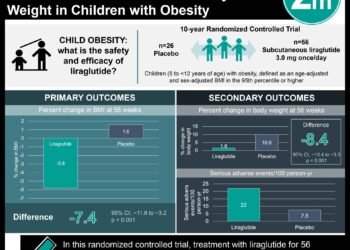Adjunctive glucose-lower therapies do not decrease risk of microvascular complications in diabetic patients
1. No significant differences in vascular complications of diabetes were seen in patients using metformin and adjunctive glargine, liraglutide, glimepiride, or sitagliptin treatment.
2. Adjunctive liraglutide treatment resulted in a small but significant difference in the rate of any cardiovascular disease.
Evidence Rating Level: 1 (Excellent)
Study Rundown: Micro- and macrovascular complications of diabetes mellitus are associated with significant debilitation and healthcare costs. Clinical trials have shown vascular protective effects of new classes of glucose-lowering medication, such as insulin glargine, the sulfonylurea glimepiride, the glucagon-like peptide-1 receptor agonist liraglutide, and the dipeptidyl-peptidase 4 inhibitor sitagliptin. Previous work has shown that metformin with adjunctive glargine and liraglutide is more effective than adjunctive glimepiride and sitagliptin in maintaining glycemic targets. The present study describes secondary outcomes, evaluating the incidence of micro- and macrovascular events. Adult patients with a diagnosis of type two diabetes were randomized to receive one of four treatments (glargine, glimepiride, liraglutide, or sitagliptin) in addition to metformin. There were no significant differences between groups in the incidence of new hypertension or dyslipidemia development. For microvascular outcomes, there were no significant differences in the incidence of renal impairment or diabetic peripheral neuropathy. For cardiovascular outcomes, the liraglutide group had fewer cases of any cardiovascular event compared to the other three treatment groups. The rates of hospitalization and deaths due to cardiovascular events were not different between groups. As a limitation, patients with a history of a major cardiovascular event or renal impairment were excluded from the study, which reduces the generalizability of the results to a population with more advanced diabetes.
Click to read the study in NEJM
In-Depth [randomized controlled trial]: This study reports the secondary outcomes of the incidences of microvascular and cardiovascular complications from a randomized control trial that evaluated the efficacy of metformin with adjunctive glargine, glimepiride, liraglutide, or sitagliptin in patients with type two diabetes. Adult patients with type two diabetes (n = 5,047) were randomly assigned to receive one of the four treatments in addition to metformin. Treatment dosages were determined based on drug labeling. Patients were followed for a mean of 5.0 years. Baseline prevalence of hypertension (77%), dyslipidemia (96%), diabetic peripheral neuropathy (42%), and history of heart attack or stroke (6.4%) reflected the general United States population. There were no significant differences in new hypertension or dyslipidemia cases between groups. For microvascular outcomes, there were no differences among treatment groups in the incidence of moderately or severely increased albuminuria levels or renal impairment, as defined by the estimated glomerular filtration rate. There were no significant differences in the incidence of diabetic peripheral neuropathy. For cardiovascular outcomes, the liraglutide group had the fewest cases of cardiovascular event [(liraglutide compared to sitagliptin group: Hazard Ratio [HR], 0.68; 95% Confidence Interval [CI], 0.51 to 0.90) and (liraglutide compared to glimepiride group: HR, 0.71; 95% CI, 0.53 to 0.93)]. The incidences of cardiovascular-related hospitalizations and deaths were not significantly different between groups. In summary, while the four groups showed significant differences in glycemic control in the primary outcome analysis reported elsewhere, there were no associated differences between groups in micro- and cardiovascular outcomes.
Image: PD
©2022 2 Minute Medicine, Inc. All rights reserved. No works may be reproduced without expressed written consent from 2 Minute Medicine, Inc. Inquire about licensing here. No article should be construed as medical advice and is not intended as such by the authors or by 2 Minute Medicine, Inc.







